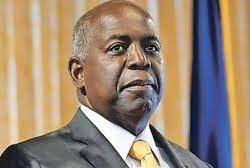
By: Keile Campbell
As hurricanes and other natural disasters have gotten more intense due to the adverse effects
of climate change, it gets more and more difficult, financially, for vulnerable countries
impacted by these storms to rebuild.
In 2019 Hurricane Dorian devasted islands in northern Bahamas with estimated damages and
loss in the billions of dollars.
In a move and with a means to find new and creative solutions to the country’s climate
financing issue, Prime Minister Philip Davis, while making his appearance at the Clinton
Global Initiative (CGI) 2023 in New York announced The Bahamas Sustainable Investment
Program to tackle the climate crisis.
He encouraged attendees to take action with regards to climate, wanting to focus on what can
be done rather than what cannot be done.
“We are going to survive an era of supercharged storms by creating supercharged win-win
investment partnerships.” Prime Minister Davis explained.
He said, “With our strategic advisors and resilience capital ventures, we will work with
regional and global capital market leaders to underwrite and place an innovative financing
facility with a target of $500 million.”
“Our priorities include climate-resilient infrastructure, clean energy transition, coastal zone
conservation, reducing biodiversity loss, regenerative agriculture, carbon sequestration, and
participation in natural asset-backed carbon credit programme. Blended finance is a smart
way to close the climate financing gap at a time when solutions cannot be postponed,” he
argued.
According to a concept note of The Bahamas Sustainable Investment Program (BSIP)
obtained by The Bahama Journal, the implemented BSIP – under the technical direction of
Washington-based strategic advisory firm Resilience Capital Ventures, aims to mobilize high
quality investments that produce risk adjusted returns and positive social impacts, as well as
adhere to global ESG standards and sustainability philosophies.
The concept note further explained that BSIP will utilize the ‘Triple B Framework’ created
by Resilience Capital Ventures founder and CEO Dr. Gillian Marcelle, which “involves a
focus on three components—bottlenecks, blind spots and blended finance— to solve
sluggishness in capital growth and reduce misallocation decisions.”
According to the concept note, it will cost a financial investment of $25 million dollars to
deliver the program over a span of five years, which the government is inviting financial
contributions from foundations, development partners, development finance institutions and
private sector investors to meet the budgetary commitment.
Prime Minister Davis, before making his announcement explained the perpetual cycle Small
Island Developing States (SIDS) like The Bahamas undergo every summer when hurricane
season arrives having already been hit by four major hurricanes in the past few years.
“A cruel irony is that those four massive hurricanes cost us billions – leaving us without the
fiscal space we need to get ready for the next storm, explained Prime Minister Davis.
“Topping the lists of countries most vulnerable to climate change makes borrowing more
expensive. Every single day, we are paying, for the hurricanes we’ve already suffered, and
the ones still ahead of us.” he said.
“In addition, our nation’s middle-income designation leaves us unable to access fair and
concessional financing for recovery and adaptation. This traps us in a cycle in which the
servicing of our debt leaves very little to invest in building our resilience,” he said.
He went on to explain the reason for his optimism towards this new investment program,
while even mentioning the assistance of marine life.
“Instead of saying small island nation – say large ocean state; our country’s sea grass
meadows which cover an astonishing 92,000 square kilometres, appear to be absorbing equal
to or more carbon than the Amazon Rain Forest. We have been mapping our seagrasses with
the help of not just scientists but Tiger Sharks, who are a critical part of our underwater
surveying team, wearing cameras and sending back data points,” revealed the prime minister.
“It’s always good to have apex predators on your side. Those sharks are going to help us
become the first country in the world to issue Blue Carbon Credits; so, as you can see, small
countries can be big pioneers,” he said.
Established in 2005, the CGI is a membership-based organization that brings together leaders
from across the business, government, and nonprofit sectors to drive action on global
challenges.
To date, members of the CGI community have made more than 3,400 commitments which
have improved the lives of over 430 million people in more than 180 countries.


